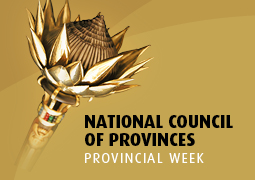
In opening the ministerial briefing session on water and sanitation that marked the beginning of the National Council of Provinces’ week-long Provincial Week Programme from 29 March to 1 April, the NCOP Chairperson, Mr Amos Masondo, said the theme for this year’s programme is Assessing State Capacity to Respond to the Needs of Communities.
In terms of the Constitution, the NCOP represents the provinces to ensure that provincial interests are considered in the national sphere of government. Provincial Week is one of the mechanisms used by the NCOP to carry out this important mandate.
Mr Masondo said the historical purpose of the programme has been to give NCOP delegates an opportunity to return to their provinces to assess service delivery. In this process, they deal directly with a range of matters affecting the provinces they represent.
The focus areas for this week were selected jointly with the provinces concerned. Mr Masondo said the programme is an opportunity for the NCOP and provincial legislatures, including the municipal councils, to conduct integrated oversight.
This is a high-impact oversight-driven programme that focuses on the challenges of state capacity in the provinces. It is also informed by the need to focus our attention on the revival of the economy, Mr Masondo went on to say, following the devastating impact of the Covid-19 pandemic and other sustained economic pressures.
The ministerial briefing is deliberate in directing us to collectively focus on assessing state capacity to deliver water and sanitation to communities, Mr Masondo continued. During the briefing session on water and sanitation on 15 March, both the Ministry of Water and Sanitation and the South African Local Government Association outlined some of the challenges relating to the provision of water and sanitation. These include the budget, personnel and skills, particularly in municipalities.
The focus on state capacity is so that we can begin to address these challenges in a manner consistent with the NDP’s Vision 2030. “We welcome the commitment by the Ministry to address the issues that are the root causes of the poor capacity of the state, including dealing with corruption and laying concrete plans to turn around water and sanitation services across the country,” said Mr Masondo.
The Minister of Public Works and Infrastructure, Ms Patricia de Lille and the Deputy Minister of Water and Sanitation, Ms Dikeledi Magadzi, appeared before the provincial delegations and other NCOP stakeholders to answer on state capacity to deliver basic services and water and sanitation to communities. Both assured the NCOP of their departments’ plans to improve the delivery of water to the people.
The NCOP’s House Chairperson responsible for committees, Mr Jomo Nyambi, told the ministers that water is life and sanitation is dignity and that South Africans deserve both. Failure of the state to deliver water also causes businesses to close, which affects economic growth and employment creation.
The Chairperson of the Select Committee on Cooperative Governance and Traditional Affairs, Water and Sanitation and Human Settlements, Mr China Dodovu, highlighted the fact that many of South Africa’s water boards are dysfunctional.

